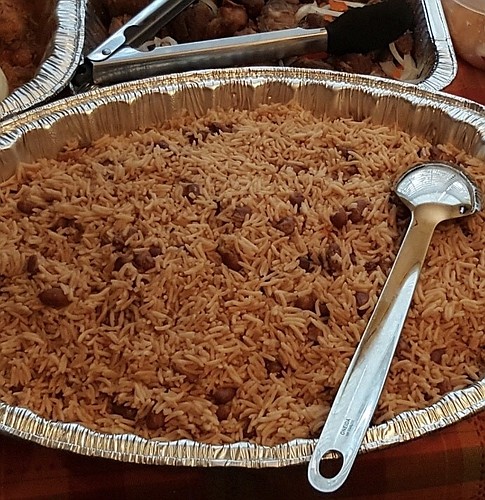- January 7, 2025
-
-
Loading

Loading

Ruby Berthole
Foundation Academy
I am a Haitian American, and food distinguished by Haitian culture has been a significant part of my family’s life — especially Haitian rice and chicken. In fact, it’s the earliest meal I can remember having with my family.
Before becoming a nation, Haiti was a piece of land in the Atlantic Ocean populated by native tribes, slaves and the French settlers who owned them. The mountainous area, then called St. Dominique, was in French control until the slaves united to start a revolt. From Aug. 14, 1791, to Jan. 1, 1804, they rose against the French for freedom and land. At the end of nearly 13 years, the French gave up their power, and the land was named Haiti, meaning “mountainous land.”
Because the French ruled over the first Haitian generation beforehand, Haitian culture was highly influenced by French culture. That’s why Haitian Creole and French share a lot of words and phrases, and it’s also why many French foods can be found at markets in Haiti.
However, much of Haiti’s culture originated from various areas in Africa, where the first Haitians lived before being taken into slavery. It is also from those African regions that they learned to cook their famous rice and chicken.
The main dish served during lunchtime would usually be Diri et Pois, which means “rice and beans” in Haitian Creole. They commonly cook white, yellow or brown rice with pinto, red or black beans. Next to the rice and beans, they would have chicken cooking in a mixture of oil and tomato sauce. Even after setting the chicken beside the rice on the plate and drizzling it with sauce, the meal didn’t have to end there. Additions could be as simple as sliced green peppers or as intricate as Haitian legume, which is a vegetable mix made of eggplant, cabbage and, sometimes, seafood.
Because both sides of my family are Haitian, I’ve eaten this food many times. When I visit my grandparents’ house, I normally find them together in the kitchen, practically ready to serve. Still, I know that every plate they make is a way of bringing my family closer together. Yes, we get to talk about how our lives have been lately and catch up, but there is another sense behind it. With every plate, I get a taste of where my relatives came from and how they lived. Every meal, we get to ask questions and learn more about our history. We get to dig deeper into our identity as a family. Whether it’s through Haitian rice and chicken or another cuisine, being able to get a grasp of your roots is something truly fascinating to bond over.
HAITIAN CHICKEN
INGREDIENTS
1 pound chicken
1/2 onion diced
2 teaspoons minced garlic
1 tablespoon lime juice
4 sprigs of fresh thyme
4 sprigs of fresh parsley
1 scotch bonnet pepper
1 teaspoon black pepper
1/2 red pepper julienned
1 Maggi chicken bouillon cube
1 tablespoon of Adobo all seasoning
1/2 cup white vinegar
2 tablespoons tomato paste
METHOD
1. Clean the chicken using the Haitian meat-cleaning method. Clean the chicken with lemon or sour orange juice and vinegar. Rinse in hot water.
2. Create a marinade with garlic, parsley, thyme, black pepper, chicken cube and seasoning salt.
3. Season the chicken with the marinade and let it marinate at least 15 minutes. Marinating the chicken overnight in the refrigerator will give the meat more time to take on the flavor.
4. In a large saucepan, brown the chicken on both sides.
Add a half cup of water to the saucepan along with the tomato paste, onions and peppers.
5. Stew the chicken on medium-high heat for 25 minutes.
6. Reduce the heat to low and let it simmer until it is ready to serve.
Source: haitiancooking.com/recipe/haitian-stewed-chicken-poule-en-sauce
HAITIAN RICE AND BEANS
INGREDIENTS
3 cups rice
1 cup dry beans
8 cups water
3 tablespoons olive oil
1 tablespoon butter
1 large onion (diced)
1 teaspoon salt
1 teaspoon ground black pepper
3 cloves (¼ teaspoon ground cloves)
3 cubes chicken bouillon
1 whole scotch bonnet pepper
2 cloves minced garlic
½ teaspoon thyme (2 sprigs)
1 cup coconut milk
METHOD
1. In a large pot, add the water, beans, salt, 1 tablespoon olive oil and allow the beans to cook for about 1 hour on medium-high heat, or until beans are soft. Once cooked, strain the water into a separate container for later use.
2. In another large pot, add 1 tablespoon of olive oil, and sauté the onions and garlic for about 2 minutes. Add coconut milk, chicken bouillon, beans and mix thoroughly.
3. Add cloves and 6 cups of the bean water to the pot and bring to boil.
4. Mix in the rice and whole scotch bonnet pepper and allow the rice to cook for about 20 minutes, or until there is just a little amount of water left.
5. Reduce the heat to medium, add thyme and butter, and cover the pot with a lid and allow the remaining water to be absorbed. About 10 to 15 minutes.
6. Once cooked, fluff the rice and serve.
Source: haitiancooking.com/recipe/haitian-rice-and-beans-diri-ak-pwa